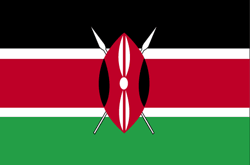Back to focus index
CIAO Focus, March 2008:
Political Unrest in Kenya

Source: CIA - The World Factbook
Charges of vote rigging in the presidential election of December 27 were followed by violent clashes along tribal lines and ethnic cleansing. According to The United Nations, more than 1,000 people were killed and at least 250,000 displaced in the bloody aftermath of the controversial election which pitted the incumbent, Mwai Kibaki, against opposition candidate Raila Odinga.
Kenya's population of 37 million is comprised of 40 ethnic groups. Mr. Odinga, a member of the Luo tribe, accused the Kikuyus, Mr. Kibaki's tribe, of dominating the government since the country was founded in 1963 by Jomo Kenyatta, also a Kikuyu.
Under strong international pressure, a power sharing agreement has been signed by the rival factions. The agreement, which was effectively mediated by former UN secretary general Kofi Annan, provides that Mr. Kibaki will remain president while Mr Odinga will become prime minister with a broad range of executive powers.
This month CIAO examines political unrest in Kenya.
From the CIAO Database:
Ethnic Coalitions of Convenience and Commitment: Political Parties and Party Systems in Kenya
Boda-bodas Rule: Non-agricultural Activities and Their Inequality Implications in Western Kenya
AIDS Treatment and Intrahousehold Resource Allocations: Children’s Nutrition and Schooling in Kenya
Outside Sources: *
Country profile: Kenya (BBC News)
http://news.bbc.co.uk/2/hi/africa/country_profiles/1024563.stm
Africa Studies Center: Kenya Page (University of Pennsylvania)
http://www.africa.upenn.edu/Country_Specific/Kenya.html
World Health Organization: Kenya
http://www.who.int/countries/ken/en/
Human Rights Watch: Kenya
http://hrw.org/doc/?t=africa&c=kenya
IRIN Humanitarian News and Analysis: Kenya
http://www.irinnews.org/Africa-Country.aspx?Country=KE
* Outside links are not maintained. For broken outside links, CIAO recommends the Way Back Machine.